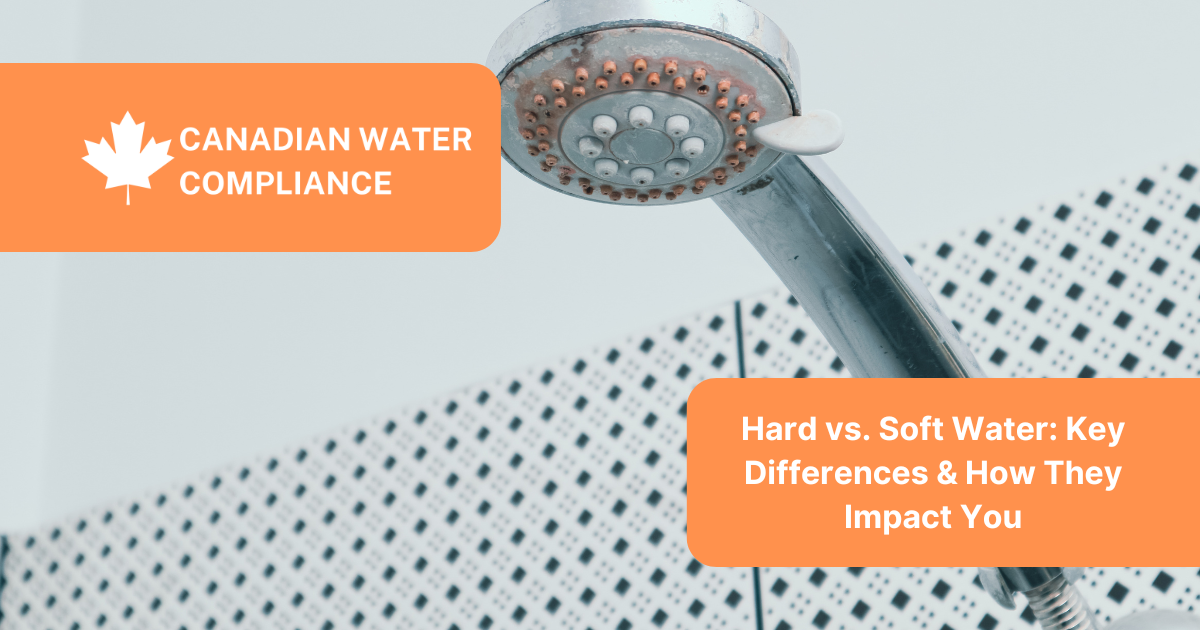
Written By: Canadian Water Compliance | On
Water is essential for daily life, but did you know its mineral content can significantly impact your health, plumbing, and appliances? If you've ever noticed white scale buildup on your faucets, stiff laundry, or soap that doesn't lather well, you may have hard water. On the other hand, soft water can prevent these issues but may have its own considerations.
In this guide, we’ll explore:
✔ What makes water “hard” or “soft”
✔ The effects of hard water on plumbing, appliances, and health
✔ How to test and treat hard water in Ontario
Hard water contains high levels of dissolved minerals, primarily calcium and magnesium. These minerals are naturally picked up as water moves through limestone and chalk deposits in the ground.
💧 Hardness is measured in milligrams per liter (mg/L) or grains per gallon (gpg):
Soft Water: 0–60 mg/L (0–3.5 gpg)
Moderately Hard Water: 61–120 mg/L (3.5–7 gpg)
Hard Water: 121–180 mg/L (7–10.5 gpg)
Very Hard Water: 180+ mg/L (10.5+ gpg)
🔹 Plumbing Issues: Hard water leads to scale buildup in pipes, reducing water flow and efficiency.
🔹 Appliance Damage: Dishwashers, water heaters, and washing machines become less efficient over time.
🔹 Soap & Detergent Problems: Hard water prevents soap from lathering properly, requiring more detergent.
🔹 Laundry & Dishes: Clothes feel stiff and dull, while glassware develops cloudy spots.
🔹 Skin & Hair Effects: Some people experience dry skin and dull hair due to mineral deposits.
In Ontario, many regions have naturally hard water, especially in cities that source from groundwater or limestone-heavy areas. Cities with high water hardness include:
London (300+ mg/L)
Guelph (280–350 mg/L)
Kitchener-Waterloo (350+ mg/L)
Hamilton (120–250 mg/L)
Soft water contains low levels of dissolved minerals. Naturally occurring soft water is more common in areas with surface water sources (lakes, rivers, reservoirs), as these sources don’t pick up as many minerals from underground rock.
🔹 Pros of Soft Water:
✔ No scale buildup in pipes or appliances
✔ Improved soap and detergent efficiency
✔ Softer skin and hair
✔ Cleaner laundry and spot-free dishes
🔹 Potential Downsides of Soft Water:
⚠ Some soft water may have higher sodium content, depending on the treatment method used.
⚠ In very soft water areas, plumbing can be corrosive to metal pipes.
Ontario cities with naturally soft water include:
Toronto (40–80 mg/L)
Ottawa (20–40 mg/L)
Thunder Bay (0–50 mg/L)
🏡 For Homeowners: DIY hardness test kits or free municipal water reports can indicate water hardness.
🏢 For Businesses: Regular water quality testing is recommended, especially for industries relying on water for operations (e.g., hotels, manufacturing, healthcare).
✔ Water Softeners – Use ion exchange to remove calcium and magnesium, replacing them with sodium or potassium.
✔ Reverse Osmosis (RO) Systems – Remove all dissolved minerals, offering purified water.
✔ Salt-Free Conditioners – Prevent scale buildup without adding sodium to the water.
Hard water and soft water each have unique impacts on plumbing, appliances, and even personal care. Testing your water hardness is the first step toward ensuring safe and efficient water use. If you suspect hard water is affecting your home or business, a water softener or treatment system may be a good investment.
📞 Need professional water testing in Ontario? Contact Canadian Water Compliance today to assess your water quality and find the best treatment solutions!